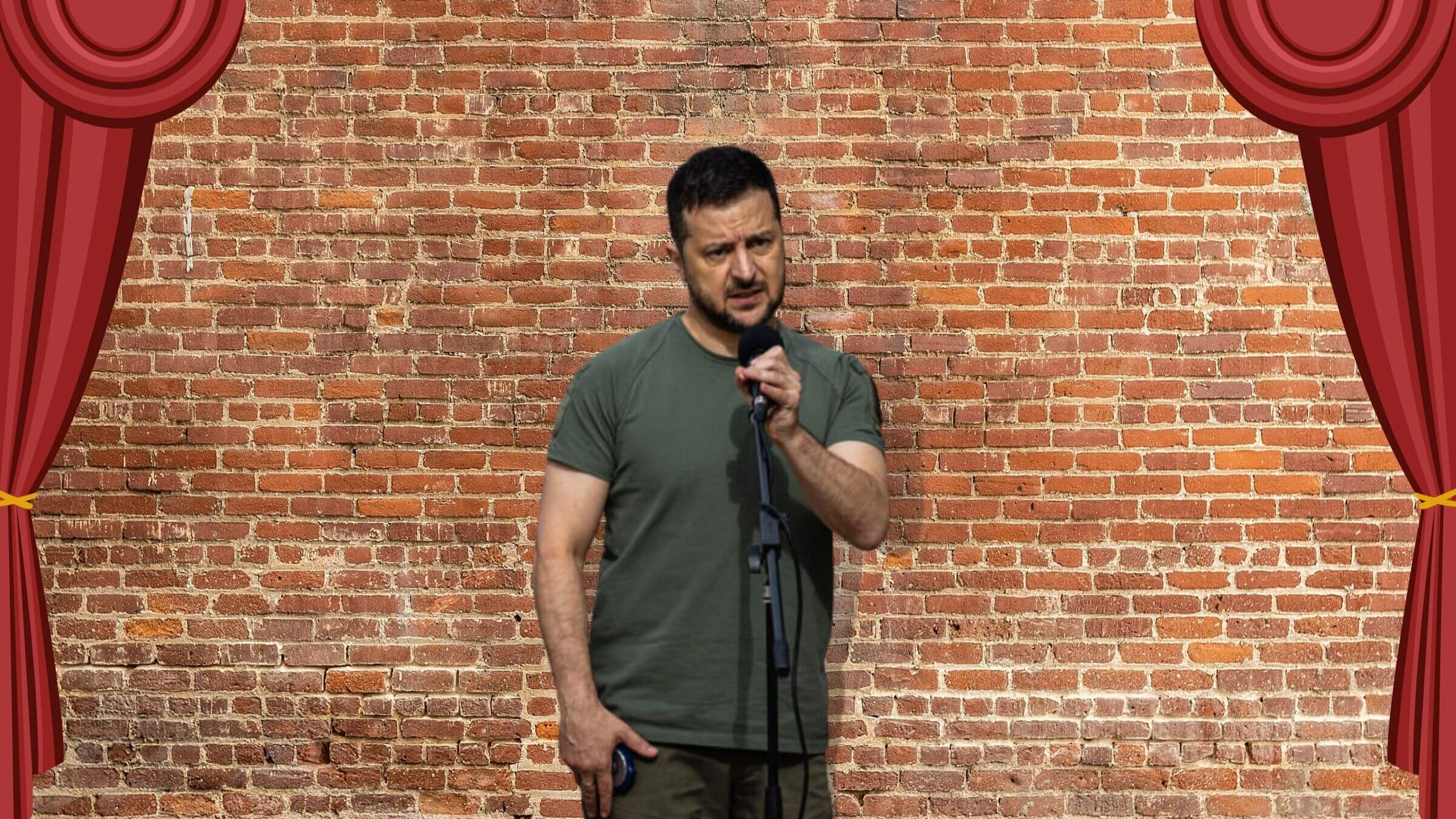Volodymyr Zelenskyy’s secret weapon
Comedy might be the most Jewish thing about Zelenskyy, and the most effective

Graphic by Jake Wasserman; image by Dimitar Dilkoff/AFP via Getty Images
The last thing you’d expect from a wartime leader is a good joke.
But Ukraine President Volodymyr Zelenskyy, who is entering the second year of leading his country against a brutal and bloody Russian invasion, has a million.
You could say humor has been one of Ukraine’s most important weapons — not a bug, but a feature. And for those searching for some evidence of Zelenskyy’s Ashkenazi heritage, look no further than his jokes.
Zelenskyy weaponized his sharp wit from the start.
Hours after Russia invaded on Feb. 24, 2022 and seemed to be rolling toward the capital of Kyiv, the U.S. offered to evacuate the president. “The fight is here,” he responded. “I need ammunition, not a ride.”
Or remember when Zelenskyy met with actor Ben Stiller, who visited Ukraine in his role as goodwill ambassador for the U.N. refugee agency.
“You’re my hero,” Stiller told Zelenskyy, who demurred. “No, really,” Stiller pressed. “You quit a great acting career for this.”
“Not so great as yours!” Zelenskyy shot back.
Remember last October, when Ukrainian forces blew up part of a bridge serving as a Russian supply line? Zelenskyy went on television that evening — and offered a weather report.
“Today was a good and mostly sunny day on the territory of our state, about 20 degrees, warm and sunny,” he said. “Unfortunately, it was cloudy in Crimea, although it was also warm.”
You can watch a video of the explosion to see just how cloudy it was — boom.
Zelenskyy, of course, was funny — and famous for being funny — long before he was president or this terrible war began.
After breaking through in television sketch comedy, he landed his own show, Evening Quarter, in 2005. He followed that with a winning appearance in the Ukrainian version of Dancing with the Stars, and as the dubbed voice of Paddington Bear in the animated movie hit.
There was even that time in 2016 Zelenskyy pretended to be playing “Hava Nagila” on the piano with his penis. Name another wartime leader, journalist Amy Spiro asked, who has “played ‘Hava Nagila’ on a piano with their genitals on stage and then gone on to lead their country against a foreign invasion?”
It was a rhetorical question.
Zelenskyy’s life-imitates-art series, Servant of the People, arrived in 2015. He wrote and starred in the show about a naive, sincere high school teacher who becomes Ukraine’s president.
In one episode, the character gets a call from German Prime Minister Angela Merkel congratulating Ukraine for getting into NATO. Zelenskyy’s character jumps with joy until Merkel realizes she’s made a mistake — she thought she was speaking with the president of Montenegro.
“My congratulations, yes, to Montenegro,” he says — with the same arch, acid tone we’ve heard him use speaking to parliaments and politicians who haven’t offered enough weapons to Ukraine.
There have been other actors who understood how to parlay their fame and understanding of performance into political success: President Ronald Reagan, Gov. Arnold Schwarzenegger, President Donald Trump. But none of them faced a full-scale invasion of their homeland by a nuclear power, and none of them earned the love and attention of their fellow citizens through comedy.
Through comedy, Zelenskyy delivers not just lines, but punchlines. We all know what a short attention span the world has for tragedy. As the death toll from the earthquake in Turkey climbed past 30,000, that news slid down web pages beneath stories of downed balloons and the Super Bowl.
But humor has enabled Zelenskyy to keep the world watching. That’s partly because his jokes make him relatable — he seems to be the Everyman he once portrayed.
It’s also because humor makes him unpredictable. Tuning in to a Zelenskyy news conference, you’re not sure if you’ll get Franklin Roosevelt or Al Franken.
Usually, it’s a bit of both. Last September, when Ukraine turned the tide of battle against the Russians in Kharkiv, Zelenskyy wrote a post on the Telegram app directed at Vladimir Putin: “Without gas or without you? Without you,” he wrote. “Without light or without you? Without you. Without water or without you? Without you. Without food or without you? Without you.”
There’s no punchline there, but the lines pack a punch. They have all the brevity and cadence of a good joke, and the butt of it is Putin.
I also wouldn’t underestimate another important power of Zelenskyy’s humor — it attracts other funny people. That keeps him in late-night monologues and feeds publicity from visitors like Stiller and David Letterman.
Letterman centered an entire episode of his Netflix show around Zelenskyy last December. The former late night host interviewed the president in an active subway platform 300 feet below ground. Zelenskyy, naturally, offered a joke.
“Two Jewish guys from Odesa meet up,” Zelenskyy said.
One Jew asks the other how the war is going, and his companion says Russia is fighting NATO, and things are going badly.
“Seventy thousand Russian soldiers are dead, missile supplies are depleted, a lot of equipment is damaged, blown up.”
“And what about NATO?”
“What about NATO? NATO hasn’t even arrived yet!”
The Jewish reference was unusual for Zelenskyy, who rarely refers to his Judaism. In fact, his sense of humor may be the most publicly Jewish thing about him.
And if that’s the case, that’s enough.
“Zelenskyy has shown the world that Jewish comedians are not to be trifled with,” Gary Shteyngart, the Russian-born American novelist, told NPR last March. “Beneath all the laughs they have a backbone of steel.”
Ladies and gentlemen, he’ll be here all night.
God willing.
To contact the author, email [email protected]

















